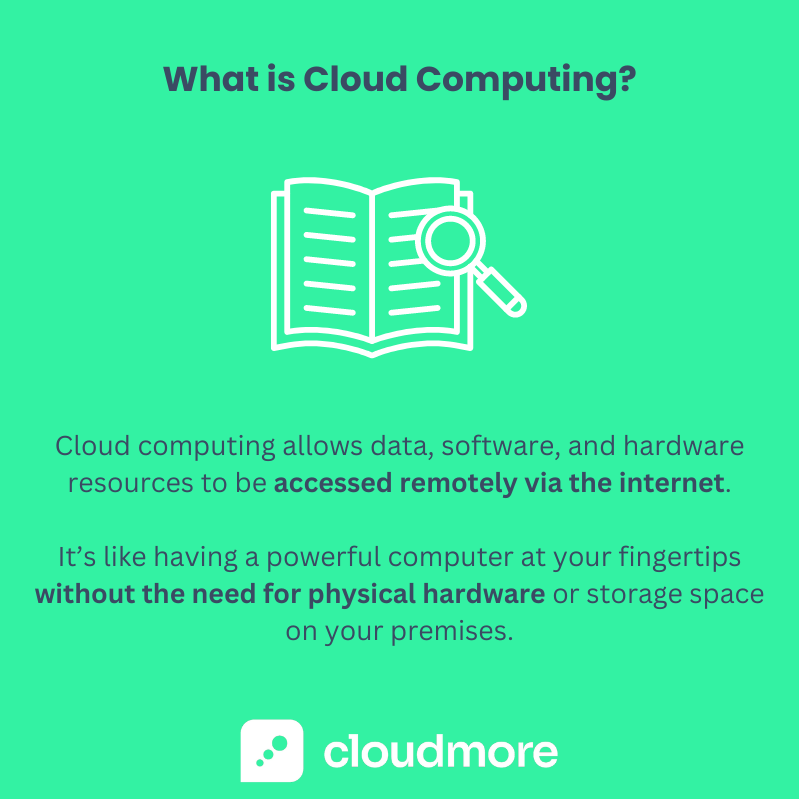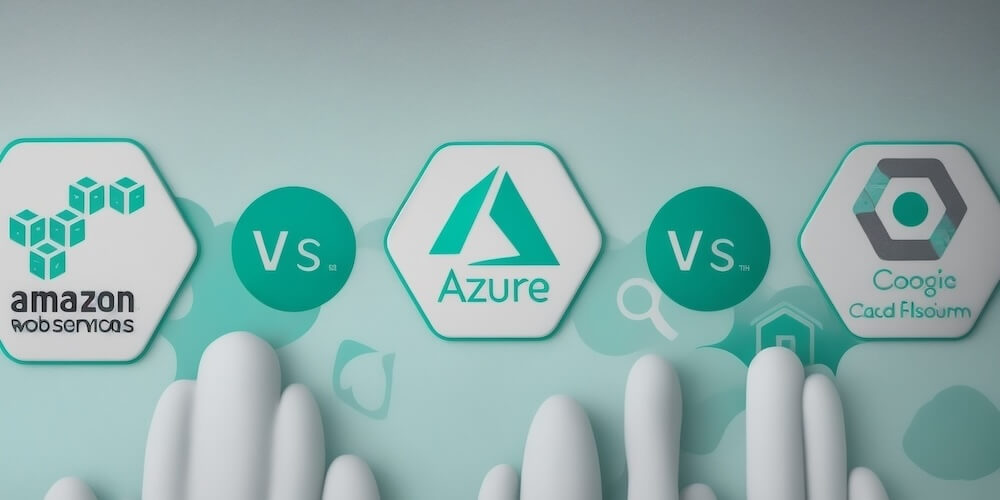Public vs Private Cloud - Key Differences & Examples
Cloud computing has revolutionized businesses' operations, offering unprecedented flexibility, scalability, and efficiency.
From the early days of on-premises servers to the dynamic, internet-based computing power we harness today, this evolution has been nothing short of transformative.
This article dives into the heart of this technological shift, comparing public vs private clouds—two primary models that have shaped the modern digital landscape.
You'll uncover the key differences, advantages, and use cases for each, providing you with essential insights to navigate the complexities of cloud solutions.
What is Cloud Computing?
In an era where digital transformation shapes every facet of business, cloud computing is the backbone of modern IT infrastructure.

With pay-as-you-go pricing models, it's the powerhouse behind the seamless, on-demand delivery of IT resources over the Internet.
The Importance of Cloud Computing in Today's Digital Landscape
Cloud computing is more than a technological advancement; it's a fundamental shift in business operations.
Cloud computing offers unmatched scalability, flexibility, and cost-efficiency by allowing companies to access computing power, storage, and applications as services without the need for internal hardware.
Whether you're a startup looking to innovate or a global enterprise aiming for operational excellence, leveraging the cloud is pivotal in staying competitive in today's fast-paced digital world.
In Brief: Public, Private, and Hybrid Cloud
Public Cloud: Public clouds are owned and operated by third-party service providers who deliver computing resources like servers and storage over the Internet.
Microsoft Azure, Amazon Web Services (AWS), and Google Cloud Platform (GCP) are prime examples. They offer scalability and flexibility, making them ideal for many businesses.
Private Cloud: A private cloud refers to cloud computing resources used exclusively by one business or organization.
It can be hosted on-site or by a third-party provider, offering enhanced security and control, which is crucial for industries with strict data regulations.
Hybrid Cloud: Hybrid clouds combine public and private clouds, bound together by technology that allows data and applications to be shared between them.
This model gives businesses more deployment options, flexibility, and optimized infrastructure, security, and compliance.
Public Cloud Explained
At the heart of the digital age lies the public cloud, a paradigm that has revolutionized how businesses access and leverage technology.
A public cloud is a platform where external providers provide computing services over the Internet, offering unparalleled scale and flexibility. This model enables organizations to use many resources without owning or maintaining physical servers.
Key Characteristics of Public Cloud
- Scalability: One of the hallmark features of the public cloud is its ability to scale resources up or down based on demand. Businesses can easily accommodate growth or handle unexpected spikes in traffic without the need for upfront investments in hardware.
- Cost-effectiveness: With a pay-as-you-go pricing model, companies only pay for the computing resources they consume. This eliminates the need for significant capital expenditure on IT infrastructure, making it attractive for businesses of all sizes.
- Maintenance and Management by Third-party Providers: The responsibility for maintaining and managing the underlying infrastructure lies with the service provider. This reduces the burden on your IT staff and ensures that your services run on the latest and most efficient technology.
Examples of Public Cloud
- Amazon Web Services (AWS): A leader in the public cloud space, AWS offers a broad set of global storage, database, analytics, application, and deployment services that help organizations move faster, lower IT costs, and scale applications.
- Microsoft Azure: Azure is a comprehensive cloud platform offering over 200 products and cloud services designed to help you bring new solutions to life—to solve today's challenges and create the future.
- Google Cloud Platform (GCP): GCP provides a reliable and highly scalable cloud computing services offering. It delivers a wide range of hosted storage and application development services run on Google hardware.
Private Cloud Explained
At the heart of enterprise-grade IT solutions lies the private cloud, a dedicated infrastructure that provides businesses with exclusive cloud computing resources.
Unlike its public counterpart, the private cloud is used solely by one organization, offering higher security and control over data and applications.
Key Characteristics of Private Cloud
- Enhanced Security and Control: In a private cloud environment, resources are not shared with others, leading to heightened security measures. This exclusivity allows for more stringent control mechanisms, which are vital for organizations handling sensitive information or complying with strict regulatory requirements.
- Customization: One size rarely fits all in the realm of IT. Private clouds shine with their ability to be highly customized to fit the specific needs of a business. Everything from the underlying architecture to software applications can be tailored to serve unique operational requirements.
- Dedicated Resources: With dedicated servers, storage, and networking components, private clouds ensure that the demands of other users do not impact performance. This allocation of dedicated resources is particularly crucial for businesses with predictable workloads or high-performance requirements.
Examples of Private Cloud
- On-premises Data Centers: Many organizations host their private clouds in on-premises data centers. This setup provides maximum control over physical servers and infrastructure, although it requires significant investment in hardware and maintenance.
- Virtual Private Cloud (VPC) Offerings: VPCs are a hybrid approach, offering the scalability and ease of the public cloud while isolating computing resources in a private environment. Services like AWS VPC and Azure Virtual Network allow businesses to create a segmented space within the public cloud, combining flexibility with enhanced security.
- Private Cloud Services by Leading Providers: many leading cloud providers offer private cloud services beyond on-premises solutions. These can be hosted externally but are dedicated solely to one client, combining providers' expertise with the exclusivity and control of a private infrastructure.
Utilizing a private cloud infrastructure, organizations can achieve unparalleled levels of security and customization, ensuring their IT environment precisely aligns with their operational needs and strategic goals.
Public vs Private Cloud: A Comparative Analysis
Choosing between a public and private cloud infrastructure is a pivotal decision for businesses, affecting their operational efficiency, security, and bottom line.
.png?width=799&height=799&name=Public%20vs%20Private%20Cloud%20(1).png)
This comparison delves into the core differences, helping you make an informed choice tailored to your unique business needs.
Security: Private Cloud Security vs Public Cloud Vulnerabilities
Private clouds offer enhanced security features because they are accessible only by the organization, making them ideal for sensitive data handling and compliance with strict regulations.
On the other hand, public clouds, managed by third-party providers, have robust security measures but share resources among various users, which could potentially expose vulnerabilities.
Cost: Upfront Investment vs Pay-as-you-go Model
The private cloud requires a significant upfront investment in infrastructure and ongoing maintenance costs suited for organizations that demand exclusive control and security.
The public cloud operates on a pay-as-you-go model, offering a cost-effective solution with no hefty initial investment, ideal for businesses looking for scalability and flexibility without substantial capital expenditure.
Control and Customization: The Trade-offs
Private clouds allow for greater control over the computing environment and the ability to customize hardware and software to meet specific requirements.
This level of control and customization is less feasible in public cloud settings, where the infrastructure is designed to cater to a broad range of customers and applications.
Compliance and Business Needs: Which Suits Better?
The private cloud's security and control features make it a preferred choice for businesses bound by rigorous compliance standards or those operating in industries such as healthcare and finance.
Meanwhile, organizations looking for agility, vast computing resources, and global scalability might find the public cloud's flexible and cost-effective model more appealing.
In weighing public vs private cloud options, consider the technical differences and how each aligns with your strategic goals, operational needs, and budget constraints.
Use Cases: Where They Shine
Navigating the cloud landscape means understanding the technology and where and how it can be most effectively applied.
.png?width=799&height=799&name=Public%20vs%20Private%20Cloud%20-%20Use%20Cases%20(1).png)
Let's explore the environments where public and private clouds best demonstrate their strengths, ensuring your business leverages the right solution for its needs.
Public Cloud Use Cases
- Startups: With limited capital and a need for rapid scalability, startups find the public cloud a perfect fit. It allows them to access a wide range of resources without upfront investments, focusing on innovation and growth rather than infrastructure concerns.
- High-Growth Tech: Technology companies experiencing rapid growth utilize public clouds for their scalability and flexibility. They can quickly adapt to changing demands without significant capital expenditure on physical hardware.
- Seasonal Applications: Businesses with fluctuating demands, such as retail companies during the holiday season, benefit from the public cloud's pay-as-you-go model. This allows them to scale up resources during peak times and scale down when demand wanes, optimizing costs.
Private Cloud Use Cases
- Financial Institutions: With stringent regulatory requirements and a need for high security, financial institutions often opt for private clouds. This allows them to maintain tight control over data and infrastructure, ensuring compliance and safeguarding customer information.
- Healthcare: The healthcare sector, bound by privacy regulations and the need for secure patient data management, relies on private clouds. These environments offer the security and control necessary to protect sensitive information and support critical healthcare applications.
- Government Agencies: Government entities prioritize security and control, especially when handling sensitive data and critical operations. Private clouds provide the framework to meet these requirements, offering a secure, controlled environment for IT needs.
By matching the cloud environment to specific use cases, businesses can harness the power of cloud computing to its fullest, ensuring efficiency, security, and scalability tailored to their unique operational demands.
Transitioning Between Cloud Environments
In today's dynamic IT landscape, the ability to adapt and transition between cloud environments can be a significant competitive advantage.
Whether moving from on-premises to the cloud or navigating between public and private clouds, understanding the best practices and considerations is vital to a seamless transition.
Hybrid Cloud: Bridging the Gap
The hybrid cloud is a powerful bridge, combining the best of both worlds by integrating public and private cloud infrastructures.
This model offers businesses flexibility, allowing them to store sensitive data on a private cloud while leveraging the computational power of the public cloud for less sensitive tasks.
It's an ideal solution for companies seeking to optimize their IT infrastructure for efficiency, security, and scalability.
On-Premises vs Private Cloud vs Public Cloud: Making the Right Move
Deciding when and how to migrate to the cloud depends on various factors, including business goals, data sensitivity, regulatory requirements, and budget constraints.
- On-Premises to Cloud: For businesses considering a move away from traditional on-premises infrastructure, cloud solutions offer scalability and cost savings. However, the decision between private and public clouds hinges on specific business needs.
- Private vs Public Cloud: Choosing between private and public cloud environments often comes down to control versus cost. A private cloud offers more power and security, ideal for businesses with strict data regulations. In contrast, a public cloud is more cost-effective, scalable, and suitable for companies that need flexibility.
Considerations for Migration
- Security and Compliance: Assess your target cloud environment's security measures and compliance capabilities, especially if handling sensitive data.
- Cost Analysis: Evaluate the long-term costs of both options, considering not only the initial migration but also ongoing operational expenses.
- Technical Compatibility: Ensure that your current applications and services are compatible with the cloud environment, and plan for any necessary modifications or upgrades.
- Skill Set and Resource Availability: Consider the skill set of your existing team and the need for additional training or resources to manage the new cloud environment effectively.
Transitioning between cloud environments is not merely a technical change but a strategic move that can significantly impact business operations and growth.
By carefully weighing the options and considerations, businesses can make informed decisions that align with their long-term objectives and IT strategy.
Key Takeaways about Public vs Private Cloud
Navigating the cloud computing landscape can be complex, but understanding the fundamental differences between public and private clouds is crucial for making informed decisions. Here are the key distinctions and advantages:
- Public Cloud: Offers scalability and flexibility with a pay-as-you-go model, ideal for businesses seeking cost-effective solutions and the ability to scale resources quickly.
- Private Cloud: Provides enhanced security and control, making it suitable for organizations with stringent data privacy regulations or those requiring customized IT solutions.
- Hybrid Cloud: Combines the best of both worlds, offering the public cloud's flexibility and scalability while maintaining the private cloud's security and control.
The choice between public and private cloud should align with your business objectives, security needs, compliance requirements, and budget.
Each option presents unique advantages, and the best choice depends on your specific operational needs and strategic goals.
Share this
You May Also Like
These Related Stories

What is a Cloud Application? Definition, Pros & Cons + Examples

AWS vs Azure vs Google Cloud - Key Cloud Services Comparison



